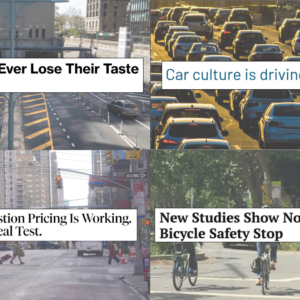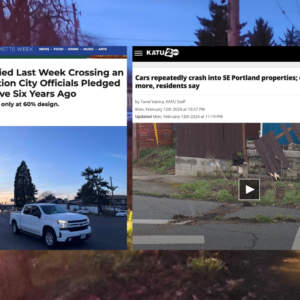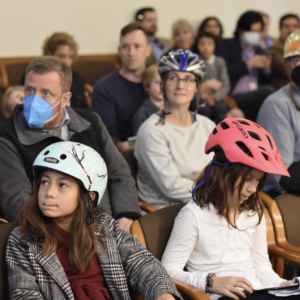“…they [legislators] had heard from a number of constituents who were very concerned and opposed to giving cyclists what they viewed as special rights.”
–Doug Parrow, Chair of the BTA’s Legislative Committee
An effort to pass the “Idaho Stop Law” in Oregon has officially ceased all forward motion.
I confirmed this morning from Bicycle Transportation Alliance (BTA) legislative committee chair Doug Parrow that they were not able to convince a key legislator to schedule a work session on HB 2690. As a consequence, the BTA will move onto other bills and shelve the Idaho Stop idea for now.
On Friday, we reported that the BTA was under pressure from House Transportation Committee Chair Terry Beyer to confirm support for the bill from at least 31 House members (the number of votes it would need to pass). Chair Beyer wanted to make sure the bill would pass before she committed to a work session.
On the phone today, Doug Parrow said that “Unfortunately, as we went around and met with legislators, it became increasingly clear that there were not enough votes to pass the bill.”
Advertisement

(Photos © J. Maus)
Parrow chalks up the lack of support from legislators to a small number of vocal constituents who called and emailed in their opposition to the bill;
“What I perceived from our meetings [with lawmakers] is that they had heard from a number of constituents who were very concerned and opposed to giving cyclists what they viewed as special rights.”
Parrow said the demise of the bill is unfortunate because he felt the BTA was making progress of late. “Perhaps what occurred,” he said, “is we just ran out of time.”
Feeling that the outpouring of early opposition to the bill (perhaps stoked by incorrect and biased news stories), “poisoned the water”, Parrow said the tide got going in the wrong direction early on and that “we weren’t able to reverse that.”
Will the BTA try again in 2011? Parrow says it’s too early to make that decision.
In the mean time, Parrow said he and others on the BTA legislative team will start thinking what they can do to get broader support and “deal with those perceptions that Idaho Stops are somehow or another a strange or unacceptable idea.”
In addition to Oregonians who voiced their opposition to the bill, the Idaho Stop Law idea was almost certainly victim to a sense in Salem that how bicycles treat stop signs simply wasn’t a priority in light of a $4 billion budget shortfall facing our state. I heard from Parrow, former BTA lobbyist Karl Rohde, and their executive director Scott Bricker that legislators were on the hot seat to only spend time on high-priority bills.
On that note, Parrow referred to an opinion article published in the Salem Stateman-Journal newspaper on April 5th that said legislators should be focused on priorities, but instead “they’ve found time to take up inconsequential topics such as prescription tobacco, bicycle stop signs, the state bird — and even bird-seed taxes.”
You know you’re in trouble when your highest legislative priority gets labeled “inconsequential” and is bundled in with bird seed taxes.
Now, with Idaho Stops in the rear view mirror, Parrow says the BTA will focus all of their attention on their Vehicular Homicide Bill (HB 3399). That bill is scheduled for a work session this Thursday, just a day after hundreds of bike advocates will be lobbying in the capitol as part of the Oregon Bike Summit.
— Browse our complete coverage of the Idaho Stop Law.
— Learn more about the rest of the BTA’s 2009 legislative agenda.







Thanks for reading.
BikePortland has served this community with independent community journalism since 2005. We rely on subscriptions from readers like you to survive. Your financial support is vital in keeping this valuable resource alive and well.
Please subscribe today to strengthen and expand our work.
Just want to send out a big FU to all of you out there who spread the falsehood that the Idaho Stop is unsafe or would create some legal or other ambiguity. Your dishonesty was successful. See you next session.
Coming from a country where stop signs are the rare exception to the rule of the yield sign, I never quite understood the American obsession with stop signs.
I’m not sure how practically feasible it is, but after the Idaho law’s failure maybe it would make sense to adopt more of a grassroots strategy: if the general rules can’t be changed, then why not try replacing stop with yield signs wherever possible, starting with bike boulevards?
When people see that the frequency of accidents on intersections with yield signs doesn’t increase, in the long term this might help with the adoption of the Idaho law.
Lots of maybes in here but it seems like a new approach to the problem is required.
I can’t really blame the pols for not wanting to look like they are fiddling as Rome burns.
Vehicular Homicide Bill – Finally, something I can get behind and support.
Of course, we haven’t heard much about it, no garnering of support. I hope the focus that the Idaho Stop has had doesn’t detract from HB3399.
I’m not sure breaking the law is the best way to change the law. It may work occasionally… but then again, who’s going to risk a felony for that?
Bummer, time to continue practicing civil disobedience.
Mike, I don’t think it’s necessary to break the law — why not *legally* try to get some stop signs replaced with yield signs? They did get the stop sign down by OMSI removed — it could happen elsewhere. That would, indeed, prove that perhaps stop signs are not always needed.
The BTA messed up in that they billed this as a bicycle-only thing.
Everyone slow-and-rolls certain stop signs. Cars, trucks, bikes, peds, skateboards…. it’s called a California Stop, folks.
If the BTA had called for the Idaho Stop (aka stop as yield, aka California Stop) to be legal for ALL ROAD USERS, it probably would have gained much more traction, and this story would be far different.
Enough with the narrow Portland-centric view, BTA. Look at the rest of the state, or at least the other metroplitan areas, that you currently do NOTHING to represent.
As for the Vehicular Homicide law: I 100% am behind this law. Finally, more personal resposibility from people behind the wheel! I hope the BTA does much better with this one.
Bummer. After the initial flood of inaccurate/poorly written news stories, it didn’t have a chance. The simple fact remains that people who don’t ride bikes are never going to even try to understand the concept, and the media reporting that bicyclists will be allowed to blow through red lights certainly didn’t help.
#8,
I’m in Eugene and the BTA represents me.
Oh well, I guess I will continue breaking the law several times a day. *sigh*
from the oregonian:
House Bill 3303 would levy a 10 percent excise tax on wholesalers of wild bird seed, including millet, milo, sunflower and thistle seeds.
The bill’s sponsor, Rep. Chris Garrett, D-Lake Oswego, says his critics shouldn’t get their feathers in a ruffle.
“I knew when I introduced it that it was going to get some giggles,” Garrett said. “If people would get over their hang-ups, it’s good policy.”
The estimated $4.8 million raised by the tax would pay for habitat protection, Garrett says.
What’s more, Oregon could secure another $4.8 million in matching grants from the U.S. Fish and Wildlife Service.
[end quote]
at least as significant as the rolling stop.
re comment 8, I do not want motorists rolling stops, thanks. the better plan is comment 2, replace stop signs with yields wherever feasible.
yes, please, lets blame it all on the BTA…I mean they are the ones who created the public perception that cyclists can’t obey the laws to begin with, right?
DJ Hurricane….nice, a big middle finger when you don’t get your way.
how “adult” of you…let it sink in, this isn’t Idaho. If you want Idaho’s laws, pack your stuff and drive east.
I fully support the vehicular homocide proposal….hopefully it comes with some actual enforcement teeth.
More Proof.
Common sense ain’t that common.
Colorado will more than likely change before OR.
Real mature DJ (#1). Way to drive home the notion that cyclists are bad mannered whiners. You’ve just given the anti-bike crowd one more reason to call their legislator the next time a pro-bike bill comes out. Good job!
Perhaps now the BTA can change it’s focus on this issue, asking that enforcement of stop sign infractions roughly follow the guidelines set forth by the Idaho stop law. After all, enforcement of speed limits generally has some buffer that allows for minor technical violations to pass without citation.
This was stupid politics 101. The BTA is so politically inept they let the critics define this before they even had a chance to try to pass this. You get some good PR about something you want to pass before you make the attempt. It was just a waste of political capital anyway. Bricker needs to go.
Oh, great… just wait till Steve get’s his BTA hatin’ hands on this one. 🙂
Sorry to see it didn’t work out. On a positive note, this whole process put stop signs in the front of a lot of cyclist’s minds, maybe folks will be paying a bit more attention and we will all be a bit more safe.
too bad…
The fact that the term ‘special rights’ is still being considered as a valid point for discussion shows how far certain interests have managed to skew the debate.
Lumping this issue in with those other topics and calling them all inconsequential is simply another political tactic by the same folks who brought us ‘special rights’ and is simply clever if transparent propagandizing being used to marginalize our interests and frame the debate in terms favorable to the opposition. Remember that was in an op-ed.
To everyone from the BTA thanks for your work on this.
oh….. I’m so disappointed to read this headline.
We paranoiacs do not deserve the Idaho law.
The concept of rolling “Idaho” stops was unheard of a few months ago.
Now it’s in the lexicon across the nation thanks to the BTA, Rep. Kopel-Bailey and Spencer Boomhower’s animation.
Cyclists have an uphill battle when it comes to spin and this bill was off from the beginning. If the video had been produced first and more advance contact was made with the media things may have been different. But this bill was always long shot and hindsight is crystal.
Even with the failure this was a worthy first step. Now another state may successfully adopt “Idaho stops” or we’ll start getting traffic planners to rethink stop signs at every intersection.
I realize this is unlikely, but couldn’t the Portland traffic engineers just decide to install a small “Bikes Yield” sign beneath each stop sign at select intersections? This is a more costly solution than redefining the meaning of existing stop signs, but it would certainly get around all this legislative/media malarky. PBOT could take up donations: “Sponsor a yield sign, make your bike boulevard more efficient.”
Might need to wait for all the hulabaloo to die down first though…
legal civil disobedience is riding on main streets with lights like Division, Powell, Hawthorne etc.
Let’s just annoy them into passing the law to make our travelways as convenient as theirs are.
This bill was destined to fail. It was too legally vague, nevermind the intentions.
As Harald said above, just put in Yield signs, case closed; plus you can rely on our friendly PBOT, not ODOT or the state legislature to make things right.
This law proposal had almost zero chance of passing. Kt #8, is, I think, correct:
“If the BTA had called for the Idaho Stop (aka stop as yield, aka California Stop) to be legal for ALL ROAD USERS, it probably would have gained much more traction, and this story would be far different.” Kt #8
There may have been less resistance to a Idaho/(legalized)California stop that would have included all road users, though it still probably wouldn’t have passed.
Yield signs. Yes. Perfect.
We can stop only when necessary and there is no cyclist clause/exemption. Let’s start small and install them on the bike boulevards and places like Ladd’s addition, where complete stops are pointless. And how about those dangerous, uncontrolled intersections.
Who needs to hear it from us?
Roger Geller? Scott Bricker?
Make sure to stop twice in front of Lars Larson just to make sure he knows you aren’t a scofflaw. Just hope he doesn’t suffer road rage and shoot you though.
Yep – move along – nothing to see here …
All I can fault the BTA on is ( in the retrospect of a previous failed attempt ) they should have waaay out in front in talking to the press and key legislators on this issue. They were not.
Being killed twice .. this will now just become a dead-horse beaten every 2 yrs.
And last comment — if you can’t beat’em then join them. I’m looking forward to stopping – completely – making sure its safe and then proceeding.
Kind of like in the “Alice’s Restaurant” song ..
If one person does it they’ll think your crazy…
If 2 people do it they might just think your queers ..
If 3 people do it they might think its a conspiracy
But if 4 people do it they may think its a movement ….
And like Arlo Guthrie said: I could do this for quite a while … I ain’t proud
Dan @23 is correct. The idea just got mainstreamed in a way that it wasn’t before.
Spencer Boomhower’s animation got frontpaged at Kos today. At 900,000 page views on Kos today that is alot of eyes.
People, please stop calling riding your bikes through stop signs “civil disobedience”. It is more like protesting. Just because we want to be able to ride through stop signs safely, it doesn’t mean we get to break the law and justify it by calling it civil disobedience.
For example, as shown by people on this site, places where they removed all signage actually made the streets safer. Now if automobile drivers said that they wanted to have all signage removed, couldn’t get it done, so then just started running stop signs, would you call it civil disobedience? Nope.
Civil disobedience is for the likes of MLK Jr., not Henry Hipster.
I’ve spent 3 years working on this so far, having actually started before I moved to Portland so I’m pretty clearly biased in some ways but I have to say that I am extremely proud of the work that I have done, as well as what the BTA accomplished here. For what it is worth I believe that if we could have gotten it out of committee it would have passed in the House just as it did in 2005. The bill was not designed to fail it was modeled after the highly successful law in Idaho.
It is true that if we had all the information, testimonials, and the video produced by Spencer back in October we might have the law passed by now, but this has been a process over the last three years, and even before that when then representative Prozanski first introduced the bill in Oregon. I admit I think I made some mistakes in how I approached certain strategies around getting it through, but I’m not trained to do any of this and so I learned a lot as I went and now feel better prepared for future efforts.
I think it is important to actually thank everyone who worked so hard on this bill because they all wanted it to pass and they all did great work, many of them volunteering their time. I’d also like to thank one person who wasn’t actively working on Idaho Style but did do the most accurate and complete reporting on the issue, Jonathan Maus. Without this website it would have been much harder for me to write the FAQ as many of the concerns I addressed within that document were originally brought up in the comments section of this blog.
I also would say that there were attempts to pass this legislation in at least 4 other states this year and that none of them got as close as we did, largely I believe because we had a larger and better team working on it. I recently listened to an interview with a New Mexico legislator who after more than a decade of trying succeeded in banning the death penalty in her state. She talked about how every year she had a little more evidence and convinced a few more people until this year when they finally won. I found it very inspiring and look forward at the end of the legislative session to helping to package up everything we learned and documented for two years from now.
That said we have more important things to do now. Contrary to popular belief the Idaho Stop law has not been the main focus of the BTA this year, the vehicular homicide law has recieved much more of our attention and is still going strong. We need some serious help down in Salem on Wednesday though for the Bike Summit Lobby Day and I hope that many of you will join me in Salem to talk bikes with our legislators.
Bjorn Warloe
I really don’t mind that it has not passed. It just reaffirms my belief that main thoroughfares are indeed the most expedient routes for cyclists and other vehicles. I will use 20th Avenue, Sandy Blvd, Division, Cully, and other thoroughfares because it is the quickest and most direct way to almost any destination as a cyclist. The failure of this legislation to pass demonstrates that side streets and residential routes are for leisurely excursions whether by car, cycle, or skateboard. When you need to get somewhere by cycle, ‘board, or car then MLK Jr., Sandy, 20th Ave, et al are the routes we are legally encouraged to use and rightly should utilize.
I’ve never heard anything suggesting that Idaho’s law constituting exemption of bikes from ‘stop means stop’ pertaining to stop signs was in Bjorn’s words, “…highly successful…”. If, as some claim, there haven’t been reports of injury or death associated with Idaho’s Idaho Stop law, the law is ‘highly successful’?
If Idaho residents haven’t complained about their bikes exempt stop law, does that make it ‘highly successful’? Did the law produce any kind of increase in the number of people choosing to ride bikes in Idaho? If the law resulted in no significant change one way or the other in the number of people riding bikes in Idaho, does that make the law ‘highly successful’?
Realistically, without any solid information about the impact of the Idaho Stop law on day to day life in Idaho on people in that state, what might be possible to say about the law, is that it hasn’t been a problem(maybe for some people, this meets the requirements of ‘highly successful’). Even that seems like a stretch given that there’s been very little comment from Idahoans about how this law has been received by residents of that state.
The proposed law was tanked after being approved by the house in 2005. This time, it was tanked in committee before even making its way to the house. Aren’t those backward steps? What percent of Oregonians really support the bike exempting Idaho Stop law? That seems like a very good question to ask before spending a whole lot more time trying again to get this law passed in Oregon.
Bjorn #33
Thanks for all the hard work, Bjorn!
That is a pretty inspiring story, and I agree that there’s a lot to be learned from this last effort.
Just in the tiny bit of time I was working on this, I was struck at how often this seemingly common-sense idea (people are already doing it! Safely!), with proven success (Idaho has been doing it for 27 years! Safely!) bumped up against a wall of some really irrational bias.
I could elaborate, but basically when I went to Ray Thomas’ legal clinic down at the BTA, a story he told rang true. He said every time he goes into a jury trial involving a bike rider he has to say to the jury basically: look, I know you all have a story about that bike rider that cut you off, scared you, and made you really mad. So let’s just talk about that story up-front so that we’re not talking about it later during the trial.
It would have been nice if we could have got to a similar point with this attempt.
A bike is a spectacular means of transportation, and that its effectiveness and progress as such can be stymied by some really disproportionate anger is… Well, it’s just something we have to work around.
And not necessarily through bike riders all trying to be less offensive to all those delicate sensibilities out there, either. Sure, it would be nice if we could all be nicer on the road, but badly behaving bikers are hardly the whole of the problem.
I think there’s some deep-rooted stuff having to do with our vehicles feeling like extensions of ourselves, and roads feeling like territory on some primal, lizard-brain level that feeds into some truely damaging rage. All that psychology is worth mucking around in, and I hope to do some of that mucking in the future. 🙂
I’m really glad the video did some good, and again, I was tremendously gratified by the response it got here on this site. I’m only sorry I didn’t get going on it sooner. Still, it was exciting to get something out there, and show people what can be done with this medium. I think it’s safe to say it generated a few ideas for other videos. Now I just have to figure out how to gear up for faster, and perhaps more elaborate productions.
BTW, if you ever want to get some eyes on something, apparently even the bottom of a post on Daily Kos does the trick. The views slowed to a trickle, but then: bam! Biggest day yet, just this afternoon.
(I just typed that “BTW” as “BTA”. I wonder if that’s a common side effect of working with the BTA.)
#35 Highly successful was how the law was described to me by IDOT bike/ped leader Mark McNeese. Similar words were used by an Idaho State Trooper talking about the law. I know you don’t necessarily support the law in Oregon wsbob, but I have spoken to a lot of leaders in Idaho about this law and I don’t think it is controversial to say it is successful there. Some may disagree on the point that success in Idaho will equate to success in Oregon, but it has worked there for nearly 3 decades.
Way to go Oregon, scaredy cat politics and whining inbred backward ass close minded genetic mishaps strike again.
As I was saying about paranoia…
It is a “special right” but who cares? (I guess some) Everybody is soooo concerned that someone else might get or have something better. In my state pedestrians have the “special right” that they always have the right of way but nobody is saying anything about that. such a shallow response that the people are concerned that it gives bicyclist a special right.
Bjorn, the question I had in mind was whether Idaho’s Idaho Stop law was as you said, “highly successful”, not whether or not the law was controversial. The law proposal here in Oregon was clearly controversial.
You respond by offering the claim of one Idaho citizen, a bike advocate working with IDOT, that the law is highly successful, but nothing to suggest he has said or even knows anything tangible to support his claim that the law is highly successful in Idaho.
I remember your comment in another thread sometime back with the reference to IDOT bike/ped leader Mark McNeese; an article he wrote or some such thing (which I believe I read. He didn’t offer anything there either to suggest whether the law was successful or not…but of course, he likes the law… .).
If it’s so, show us something that truly establishes that Idaho’s bike exemption from ‘stop means stop’ law, the Idaho Stop is ‘highly successful’ before imagining that people with doubts about such a claim will be persuaded that the Idaho Stop law is a good thing for Oregon.
Are the police exempt from pressure regarding enforcement prioritization? Why? They are enforcing laws that our elected representatives created. How do we convince them to pay attention to more dangerous violations? (e.g. the fool in the blue pathfinder that ran the stop at 16th/Salmon last thursday who nearly clobbered me because he was too busy talking on the phone to responsibly drive his CO2 machine and obey traffic signals.)
When I talk to police, they always seem to bring up their concern for encouraging “the flow of traffic”. By enforcing non-theatening violations like bike yields, they are impeding the flow of traffic. Seems like an insincere concern.
So if we each look critically at the stop signs along our daily routes and make suggestions to the following people for sign removal/replacement, maybe we don’t need this legislation and the BTA and the police and others can get on with all the other work there is to do:
Portland
Transportation Safety & Neighborhood Livability Hot Line
503-823-SAFE
safe@pdxtrans.org
Oregon Traffic Roadway
TEOS.Info@odot.state.or.us
Phone: 503-986-3568
Fax: 503-986-4063
http://www.oregon.gov/ODOT/HWY/TRAFFIC-ROADWAY/contact_us.shtml
YAY!
Now, if you wanted to change out street signs so that certain signs were Yield for bikes, I would be fine with that. But declaring that Stop signs now have different meanings for different modes of transportation? That’s just assinine.
All of this politicization of the Idaho law has changed my riding. I’ve personally adopted the rule knowing the (legal) risks I take. As I see it, I ride simultaneously thinking about safety and respect for all road users. There is no safer way to ride than the way I ride. I’ll choose safety over the law every time.
A complete stop (when not necessary) is unexpected and starting from absolute zero increases exposure.
Meanwhile, Oklahoma HB1795, allowing bikes to roll reds, is still ALIVE, suckaaaaaaaaaaaaaaaas!
wsbob, here’s what Joe Rose said in the O on April 6 re: the success of the Idaho law:
“In fact, according to new research from the University of California’s School of Public Health in Berkeley, the [Idaho] law has made roadways safer, while getting more people to commute by bike.
But the year after the Idaho Stop became law, bicycle injuries in the state actually declined by 14.5 percent.”
And here’s the link: http://blog.oregonlive.com/commuting/2009/04/idaho_stop_is_a_go_for_bicycle.html
Okay?
A decline in bicycle injuries may or may not have been due to the enactment of the law.
Are these numbers based on accidents at intersections only, where the law applies or across the board?
This reduction could be based on increased helmet use, or maybe the weather that year was horrible and fewer people were riding fewer miles.
Without context this number is meaningless.
There are lies, damn lies and statistics.
A complete stop (when not necessary) is unexpected
Only a Portland cyclist would consider a complete stop at a stop sign as ‘unexpected’. As for exposure, it seems to me that all the cyclists that consistently move in front of other cars or cyclists with the right of way are as exposed as possible.
As I’ve said a few places, people need their own experience. Nothing the BTA did (and they did great research and testimony) can change that.
The most telling point of the debate was Rep. Nick Kahl (D-Awesome) who said at the hearing more or less “I was opposed to this bill last week. Over the weekend I went to Bike N’ Hike to test ride a bike. And as I rode through the neighborhood, I was amazed at how many stop signs there are and how difficult it would be to completely stop at each one.” (he continued and told another great story)
Legislators need to take the time to try it out. Hopefully during the interim we can get legislators all on bikes riding through over-stop-signed neighborhoods and have them discover for themselves what this bill is about.
Without that, they’re stuck relying on misperceptions, angry constituents, and soforth. Personal experience is the way to go, and hopefully we can get there.